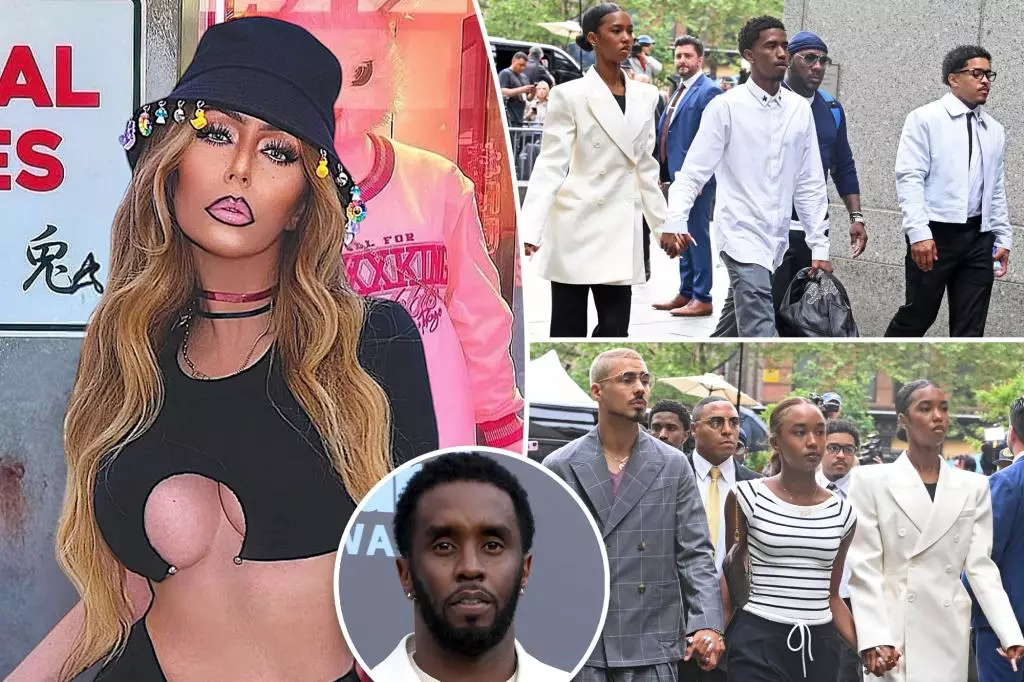The recent revelations surrounding Sean “Diddy” Combs have thrust the world of celebrity trials back into the spotlight, raising ethical questions about the role of family in highly publicized legal battles. As the renowned hip-hop mogul faces serious allegations of sex trafficking, the sight of his children attending court has sparked significant outcry, particularly from former Danity Kane member Aubrey O’Day. O’Day’s sharp criticisms underscore a growing concern regarding the psychological toll such public scrutiny may have on minors who are thrust into the center of such sordid allegations. Is it a strategy for sympathy and optics, or is it simply a severe misjudgment on the part of a father who seems to prioritize his image over his children’s well-being?
O’Day doesn’t mince words when she condemns Combs for allowing his children to witness testimonies laden with graphic details of alleged sexual depravity. The discomfort engendered by the testimonies, which recount disturbing acts that Combs reportedly observed, paints a haunting picture of parental selfishness intertwined with legal strategies. The reality that children might be subjected to thoughts about their father’s sexual exploits is more than unsettling; it raises profound questions about the ethics of parental involvement in legal scenarios where children should be shielded from trauma.
The Illusion of Family Support
Combs’s children reportedly showed up regularly at the trial, offering an image of familial solidarity that could easily be interpreted as an effort to sway jurors. O’Day’s analysis suggests that this public show of support is more theatrical than genuine; it acts as a smokescreen for the legal challenges facing their father. In her view, their presence serves a dual purpose: projecting a façade of normalcy while simultaneously manipulating the courtroom atmosphere in favor of the defense’s narrative. This “optics game,” as she describes it, raises ethical alarms about the appropriateness of using family ties to influence legal outcomes, particularly when those ties expose innocents to traumatic revelations.
It begs one to consider where the line is drawn concerning what should or shouldn’t be subjected to public scrutiny. A father’s right to defend himself in court is undeniable; however, this right does not erase his obligation to protect his children from being entangled in the uncomfortable repercussions of his actions. The balance between parental rights and responsibilities seems precariously tilted, with damaging ramifications for a younger generation that bears witness to its father’s alleged misdeeds.
The Children’s Perspective: A Silent Crisis
One cannot help but wonder how Combs’s children—ranging from ages 2 to 33—process such complex realities. The very act of attending court leads to questions that no child should have to confront: Why is my father on trial? What do these graphic details mean for my family? The mental and emotional consequences of such exposure could be profound, potentially leading to long-lasting trauma. Society often overlooks the psychological impact on children caught in the turbulence of parental scandals, prioritizing spectacle over the well-being of those who have little control over their circumstances.
Could the incidents witnessed in court lead to a fractious relationship between the children and their father? The narrative surrounding his behavior inevitably shifts, infusing the family dynamic with tension and uncertainty. While many people have seen their fathers as figures of safety, Combs’s children might be left grappling with feelings of betrayal and confusion. O’Day’s concerns seem justified when considering the future of those affected—will they grow up seeking validation and understanding in a world that has repeatedly laid their father’s flaws bare for all to see?
Voices of Dissent in Celebrity Culture
Aubrey O’Day’s vocal condemnation of Sean Combs isn’t merely an isolated outcry; it reflects a broader societal dissatisfaction with celebrity culture that often prioritizes fame over fundamental values. The constant barrage of images showcasing celebrities in compromising scenarios can breed a culture of desensitization to egregious behavior. As society watches in rapt attention, it becomes essential to question the ethical dimensions of celebrity accountability.
Indeed, are the stars we idolize held to the same moral standards as everyday individuals? Combs’s trial is emblematic of a larger issue in celebrity culture, where the line between public adoration and personal accountability blurs. It leaves us questioning the very fabric of our values. As viewers become mere spectators in the lives of celebs, we must confront the consequences of allowing fame to overshadow unassailable truths.
In reflecting on the actions of Sean Combs and the implications for his children, we are compelled to pursue conversations about accountability, compassion, and what it truly means to protect the next generation in a world where public and private life often collide in terrifying ways.

